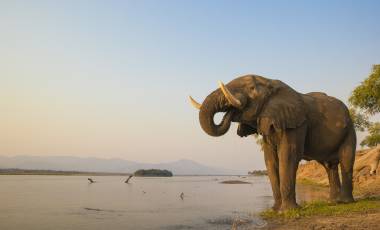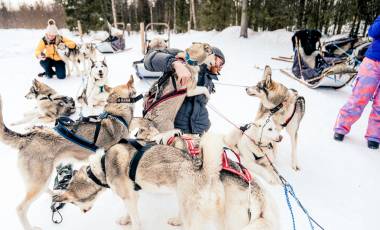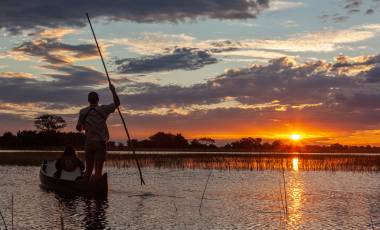In response to our world’s double crises of climate change and accelerated biodiversity loss, Exodus have committed to support thriving nature through our Nature Positive approach. As part of this commitment, we are delighted to partner with NatureMetrics and the International Union for Conservation of Nature (IUCN), in support of the eBioAtlas. Together, we have set up a process that enables our clients to collect eDNA samples on some of our chosen adventures, directly contributing to conservation action whilst informing world biodiversity policy.
Our special Citizen Science Departures are shown in the Dates & Prices tab of the trip so you can easily select these particular departures of any the featured trips.
Our planet faces unprecedented challenges – not only the climate crisis, but biodiversity collapse. The nature and unique ecosystems that we take customers to explore on our adventures are vital for the survival of our global society but are left increasingly under threat. As a business, we feel compelled to act, and our customers also increasingly tell us that they want to see Exodus prioritise the protection and restoration of nature and wildlife.
This project not only enables us to use our trips to help support a pioneering global biodiversity conservation initiative, it also enables our customers and supplier partners to get directly involved in increasing our knowledge on endangered species around the world and helping to preserve and restore nature.
Your tour leader will provide the group with three easy-to-use NatureMetrics eDNA kit containing everything your group will need to collect three eDNA samples, identifying any species present up to a square mile around your location.
At a freshwater source at a pre-appointed location on your itinerary, your tour leader will guide you in how to take the sample, pushing the water through the eDNA sample filter. Our local operator will then send the eDNA samples to the NatureMetrics laboratories for analysis. We will tell you which animals you have discovered in your sample and therefore, what animals were present at the same time you were on your adventure – even if you didn’t see them with your own eyes.
The NatureMetrics eDNA kits have been specially designed so that they are simple to use by anybody. The kits have since been used and validated in 85+ countries including in many different environments from remote Peruvian rainforests to the poles. It’s important that the DNA samples are easy to use because eBioAtlas is all about bringing people together to be a part of the solution towards reversing the biodiversity crisis. The NatureMetrics eDNA kits contain a bag for collecting a water sample, a syringe for measuring the volume of water, and a unique eDNA water filter and preservative solution to filter water DNA samples and protect the DNA sample on its return to the lab. The kit also contains gloves to ensure that human DNA isn’t included in the sample, and a reporting card to take note of any important information like the weather and the date of collection.
The eDNA water filter and the reporting card are the only parts that are used in the NatureMetrics lab analysis, but all remaining kit components are returned to NatureMetrics for recycling so that no plastic waste is left in the environment.
Each group will get approximately three samples per freshwater source is enough to provide a scientifically robust sample. Beyond that, the current cost of taking the sample, organising its delivery back to the UK, lab analysis and report production means that it is currently not cost effective to provide a kit per person.
Once your sample has been collected, it will be shipped back to NatureMetrics’ laboratories where the DNA sequences will be extracted from the filter. The vertebrate DNA that you have collected will then be matched to the species it is from, referring to global species databases to determine the best species match. A report will then be sent to you, giving you information on the vertebrates present at the time of your trip.
All samples collected will be added to the global eBioAtlas. eBioAtlas is a step change in our ability to understand and restore nature. A transformational global baseline of biodiversity delivered by combining cutting edge eDNA technology with the power of the global community. Data gathered from your samples will be used by IUCN to better assess trends in threatened species and will be made available to conservation organisations to protect and restore nature in the area of your trip. It will also be made openly available to the world via the United Nations Global Biodiversity Information Facility.
NatureMetrics will provide a report to Exodus around two to three months after samples being received to the laboratory; it takes time for them to process these samples. We will then provide a report to you within a few weeks thereafter.
Yes, the results will be emailed to you. You will receive a pdf of your results from Exodus. You will also receive access to the eBioAtlas database platform hosted by NatureMetrics. This will provide you with access to all samples collected throughout the Exodus Citizen Science Departures.
The eDNA water filter and the reporting card are the only parts that are used in the NatureMetrics lab analysis, but all remaining kit components are returned to NatureMetrics for recycling so that no plastic waste is left in the environment
eBioAtlas is a step change in our ability to understand and restore nature. The programme is delivering a transformational global baseline of biodiversity by combining cutting-edge eDNA technology with the power of the global community. The eBioAtlas, a joint initiative of IUCN and NatureMetrics, is empowering projects around the world to monitor biodiversity by using DNA technologies developed by NatureMetrics. Together with project partners and citizen scientists, the data from this programme will map the global distribution of species using the most powerful biodiversity technology available.
The sample-taking process is simple: It is based on the fact that all living things leave traces of their DNA in the environment, such as fish leaving their DNA in waterways and wetlands. Clients travelling on a Citizen Science departure will collect this DNA using the NatureMetrics’ environmental DNA (eDNA) kits, and their scientists will then reveal the species present in different ecosystems, unravelling information about where these species are living as well as their migration habits, and it all starts with clients simply pushing water through a filter with a syringe during their trip.
The information collected will be part of the world’s largest repository of fauna species data, contributing not only to local biodiversity but also to a complete global map. This will inform species assessments on the IUCN Red List of Threatened Species and help identify sites in need of protection as Key Biodiversity Areas.










